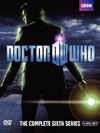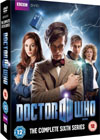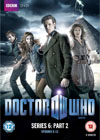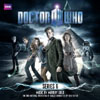DVD Extras (box sets only) include:
Well, thank goodness that with both this episode and the previous one, we get such intriguing stories instead! Yes, there's a bit of World War II in this one, but the focus of the story is really elsewhere while it takes a bit of time to criticize the mindset that the title seems to have wanted to encourage. If only title and theme had aligned themselves instead of working against each other. In fact, the mindset criticized here is critical to understanding the big foreshadowed event of the season, so it does earn its place. So what's with my title "Vultures Circle"? I had thought I might stick with the obvious switch to "Friends" style titles by calling this "The One with Mels and Hitler", but putting Mels' name in there, while appropriate, might call too much attention and scrutiny to it, thus undermining a great reveal. No sense just calling it just "The One with Hitler", since he's an unimportant bit player AND a turnoff. So I stuck a bit closer my original idea, to call extra attention to the thematic core of the story, which to me was all about the mindset of a kind of vigilante hunter - not ones who stand up against current threats, but ones obsessed with the dead carcasses of prior threats - "vultures", if you like. And we can liken many of this story's main players to vultures who circle round each other looking to definitively and decisively take the upper hand. Also, the simple "plural subject, verb" structure was meant to prepare to complement the expanded title of the previous episode, as in: "Vultures Circle" when friendship dies and true love lies.... or some such clever thing... but in the end this bizarre verse neatly typed out on the inside cover of the DVD box set doesn't really contain any imagery that deserves to be elevated to the status of an episode title, or subtitle.
Terminator VulturesSo let's look at this story's theme, which takes an idea Moffat first revealed in "The Pandorica Opens" (story no. 217), and recently expanded on in the previous story at Demon's Run. Namely, the Doctor's reputation in some corners of the galaxy is not so rosy. In fact, some cultures now view him the way the modern western world has come to view Adolf Hitler, an old war criminal who deserves to be brought to justice. There's certainly enough of a trail of carnage left in the wake of many of the Doctor's adventures to make such an accusation stick, and to find another contender for best episode to prosecute this dark aspect of the Doctor's character, only the "Mindwarp" (story no. 145) segments of "The Trial of a Time Lord" are quite as direct and to the point.Because this kind of flip, saying one culture's hero is another culture's most evil villain, is a worthy element to explore, I think I'll forgive the Earthly World War II setting and inclusion of Hitler in the story, because this is imagery that evokes many of the sides of the issue quickly and efficiently, allowing for comparisons and developments beyond the obvious in a single television "hour". Besides, the characters that we actually focus on during this adventure are such fascinating pan-galactic sci-fi wanderers that this really feels like something that could have taken place anywhere. Perhaps it would have earned more points with me had it been an even more displaced metaphor on some alien planet with a completely fictitious dictator, but would the theme have come across as well?
River Song comes in as a vulture with nearly identical motivation as the Tesselecta, inviting obvious comparison. The fact that the Tesselecta crew then thinks she should be a prime target of their justice machine paints them a nice shade of hypocritical. River is probably the best character here for blurring the lines between prosecutor and accused, because she plays both, attempting to prosecute both Hitler and the Doctor, and being the accused in the face of the Tesselecta. Of course, no character involved in the creation and operation of the Tesselecta machine is particularly bright, from motivation to temporal beliefs to robot design. Once again, Moffat gives us a long stream of single-rewritable-line temporal babble from its crew, which in this case actually suits these characters fairly well. It's just a crying shame that better theories have no voice in the episode to counter such views. At least the Doctor is generally critical of the motivation behind the idea of the Tesselecta, but nailing their temporal theory to the wall would make them even more pointless still. The ultimate idiocy is including antibody subrobots within the main machine, which operate in a manner guaranteed to go out of control at some point. Perhaps they would be easier to get away with if the Tesselecta was primarily organic, and had a need to combat hostile bacteria or the common cold. As mechanical devices, their function is highly suspect. For example, you go back in time, looking to find someone like Hitler and "give them hell", but you know you can't kill him because that would change time too much, and you think that's a big no-no. BUT, somehow you see no problem in teleporting one of his nasty aides inside the machine and letting him get taken out by machines operating on automatic. If the aide was responsible for as much villainy as they say, how does that not change time too much? Thus their theory of time falls apart by its own internal logic, aside from the fact that we all know how bogus it is in the first place. Plus, on a level of pure horror-appreciation, the antibodies talk way too much to inspire a sense of fear of otherworldly unknowns. Specifically, they go on and on about what they are going to do to people, while there is no sense of what may be preventing them from just doing it already - which makes them look useless in the end. All the subsequent fuss by the production team over their exact look and movement seems to be wasted without this bit of character logic being worked out. But I guess we shouldn't expect anything smarter from any fictional characters who would make and deploy a Tesselecta... so in that sense the story still does essentially work.
Let's Save HitlerAs a side note, if you dig around, you will probably find stories and rumours that Hitler had contact with offworld creatures, passing up trade deals with peaceful ones, and taking the quicker, easier, more seductive bargains with power-hungry ones. In some of these stories, he is a man who received visits from demons who appeared impossibly in his private rooms as though by teleportation or holographic communication, and who gave him hell and kept him in line using fear tactics. Well, if that isn't the classic New Millennium template for the challenges that the Doctor would help a guest character overcome in a Doctor Who story, I don't know what is... and here the Doctor manages to save Hitler from one or two of his demons much like he did for "The Girl in the Fireplace" (story no. 175) and so many others. What a nice irony! Our man will help anyone with challenges out of their depth, even Hitler. This is another of the ways that the episode rises above its title to maintain its own integrity. Good one.
Mythology in MontageThere are so many really nice sections in this story. Moffat earns a lot of points for showing just the right amount of story in so many different times and places, and skipping between them expertly. And what an entrance for our River Song. Nicely done! If the last episode's big River revelation was a bit limp, this one is absolutely knock-your-socks-off explosive. In fact, of all the River Song episodes this season, this one really uses her and defines her better than any others, and the episode is placed at a point in the season where we'll know her and be sympathizing with her and wanting to see her get pointed in a better direction where she can find redemption.In some senses, we end up tying up various ends of various timeloops here, which can easily get a bit dull. But there is a lot being done to put strong emotion into it both by the script and the cast, and it's still a very good ride for the audience. Of course, we get a very good section showing both Amy, and now Rory, as young children, which fills in a lot more detail and makes Rory a much more integral part of Amy's life than before. And we get Caitlin Blackwood giving us more of the excellent, solidly practical young Amy. Awesome. Two thumbs up. In all of this, we learn why Amy can't have her baby back to watch her grow through childhood into adulthood - she's already seen her go through all those childhood and teenage years. It's all brilliant and exciting and hasn't been done before on this show. Good stuff. On the downside, the Doctor doesn't have a heck of a lot of good things to actually do himself, hands on, in the second half of this story. He's mostly flopping around and needing other people to help him, although Matt Smith keeps these portions interesting and charismatic. But there's still a decent dynamic here, as he works hard to figure things out and point his friends in the right directions to resolve events that are as much their problems as his. There's still enough good stuff here to keep the story working really well.
Poison Plot PotentialI seem to remember great pains being taken in an episode of the 1960's spy sitcom "Get Smart" to define the mechanics of how to apply and subsequently protect oneself from a kind of lipstick poison, involving a kind of transparent film over the lips to prevent poison being absorbed where it isn't wanted. Similar ideas appearing here receive no on-screen equivalent to define such mechanics, diffusing possible sources of tension for the audience to follow.... in fact, you probably have to go all the way back to "The Time of Angels" (story no. 211) to find dialogue mentioning any type of lipstick, in that case hallucinogenic, being River's weapon of choice.Firstly, when did River apply some such thing to her own lips in this story? If you place such a moment too early, you'd have to wonder how the poison (and protective film, if any) would survive her regeneration without getting mangled or absorbed into the body somehow. But there's an obvious out here, if she applied her lip guard and poison in the moment when she goes looking to weigh herself and find a mirror, while the Doctor, Amy, and Rory are still in too much shock to pay attention. Secondly, after the deed is done, as she is about to make her favourite kind of exit jumping out the window, does she touch her hand to her lips while blowing him a kiss? If so, you have to wonder how she isn't poisoning herself. Thirdly, how many regenerations does River have that she gave up to save the Doctor? Does her lip guard and poison survive the artron energy blast that she later uses to cure the Doctor? It seems she was so overjoyed to make him come alive again, that she kisses him again. Wait, aren't those still lips of death? Or did she peel off the lip guard and poison when she changed clothes? Ideally, the audience deserves a little something to see that such an important consideration is dealt with. Otherwise, imagine the irony, if she had poisoned him yet again in the exact same way, after having sacrificed so much to save him. It's black humour for sure, but this episode provides such a ripe opportunity for it, it's hard not to keep thinking about it after it occurs to you.
Dividing the Season - Is this a Two-Parter?I had no idea that half of the season had been delayed until autumn for first broadcast until I saw the end credits of the previous story, since I prefer waiting for the full season DVD box set to come out each November rather than trying to figure out what bizarre times of the year some Canadian station will broadcast it, just to get chopped up episodes full of ads. Interesting. If half-seasons do work better for ratings, perhaps it says something sad about either audience attention spans, or the predictability of television episodes in general.At any rate, let's hope this split wasn't the only reason that the first half of the season decided to break the season template so successfully. In fact, it feels like Steven Moffat has written a modern Star Trek style of season cliffhanger / next season opener, a kind of disguised two-parter. It probably parallels Deep Space Nine most closely, where such things were often disguised by different titles and separate locations. Then again, it could be just dismissed as two separate installments of the larger River Song saga that just happen to have no other episodes in between. Though I had considered calling this a two-parter, not least because it would provide more wiggle room to avoid the horrid on-screen titles, I think it is better to acknowledge that these are two very different stories altogether. And I like them both.
International Titles:Deutsch: "Gegen die Zeit"Not surprisingly, the Germans found an alternative way to title the episode, which literally means "Against Time".Sadly, none of the other languages we usually examine saw fit to avoid a deplorable imperative verb in their titles...
This story has become available on DVD and Blu-ray. Click on the Amazon symbol for the location nearest you for pricing and availability:
Note: The full season sets contain commentaries, behind-the-scenes featurettes, and other extras. The smaller volumes feature little more than the plain episodes. Comments on this article are welcome. You may contact the author from this page:
|
||||||||||||||||||||||||||||||||||||||||||||||













